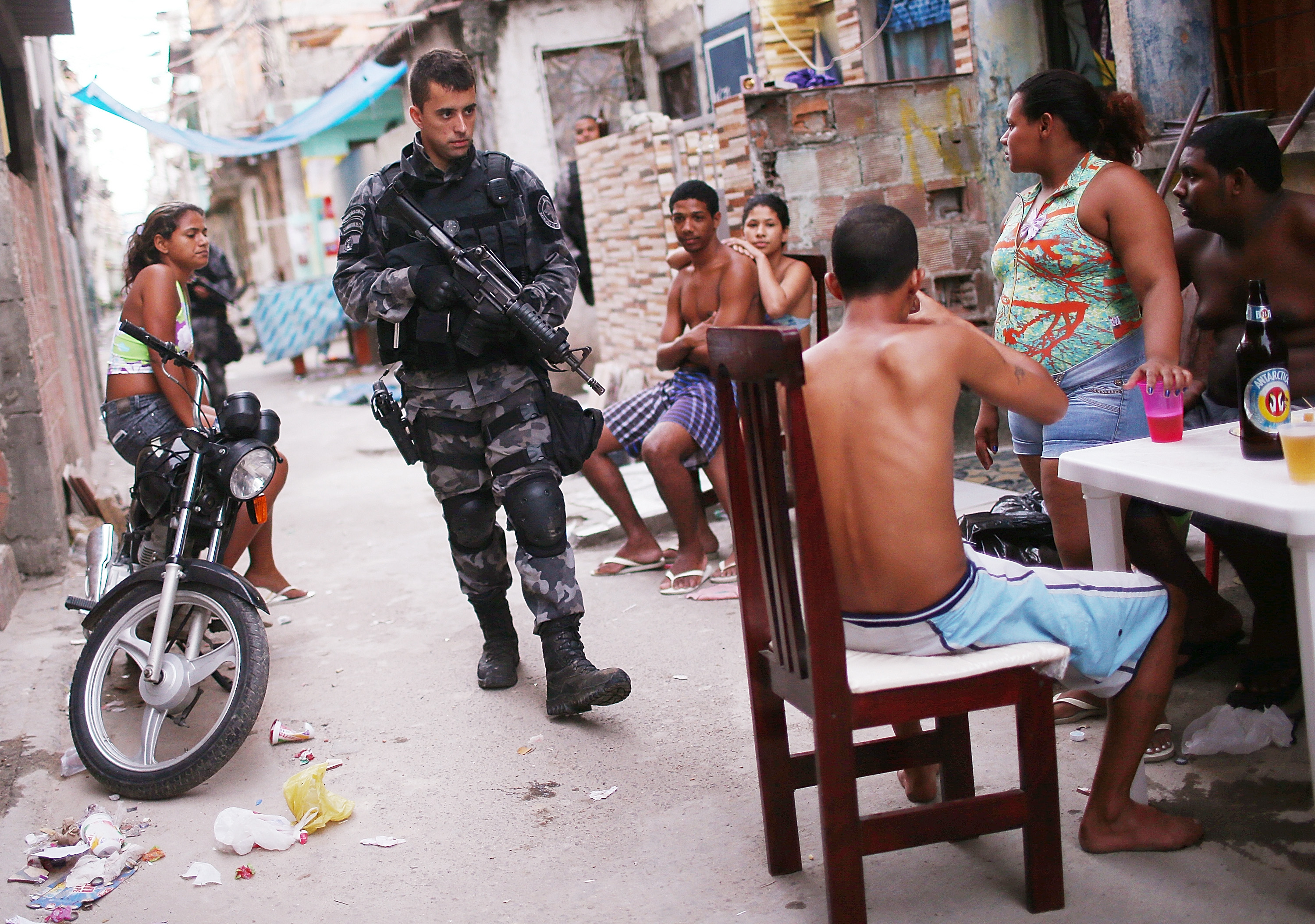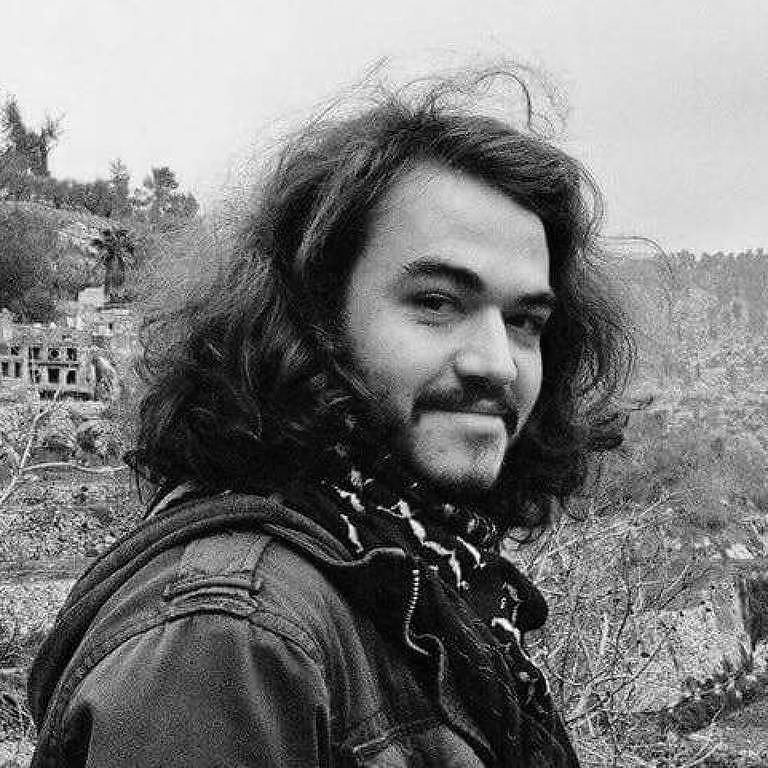They are reporting from the frontlines of one of Latin America’s deadliest armed conflicts. To do their work, they face a constant threat of violence from security forces, paramilitary groups and armed gangs.
By all measures, journalists from Rio’s favelas are among the bravest war reporters in the world. They operate in the densely populated impoverished neighborhoods, home to 20% of Rio’s population, which have spread over the city’s hillsides and peripheries as a result of gentrification and inadequate urban planning.
Still, despite the dangers, favela journalists continue to document human rights violations and provide an essential service to their community.
But they do not nearly have the resources they need — and many risk their lives daily, for no pay at all. In fact, they struggle to be seen as real journalists by their colleagues in corporate media — at best, they are derided as media activists of sorts.
“The work of journalists in conflict areas is often romanticized, but the same things are happening here and we’re not looked at,” says Gizele Martins, a journalist from Maré, a large cluster of favelas in Rio de Janeiro. She has been covering the human rights situation in Rio’s favelas for community outlets for twenty years. Throughout her career, she has received over a dozen death threats, often resulting in self-censorship.
In her book “Militarization and Censorship,” Martins describes how favela journalists face constant harassment by security forces. They’ve been prohibited from recording police operations and have had their phones seized and photos wiped. When covering local protests, they’ve been attacked with stun grenades and live ammunition. On more than one occasion, soldiers have invaded newsrooms and forced local radios to air pro-military propaganda.
“Doing journalism while living in the favelas is a great challenge,” says Martins. “Our lives are completely vulnerable, because the security forces can do whatever they want without accountability.”
Local media under pressure from all sides
Despite being chronically neglected by authorities, favela residents have a long tradition of grassroots organizing. Residents run community radios, newspapers and digital media informing residents about a range of issues, from the local economy and culture to house demolitions and police killings.
“Our reporting mostly targets favela residents,” says Buba Aguiar, a journalist from the Acari favela in Rio who produces content for a local digital outlet. “For example, they can check our page to learn whether there is a police operation going on, and if it’s safe to leave their houses.”
Since the start of the Covid-19 pandemic, these outlets have focused on disseminating information to prevent the spread of the virus. One of these outlets has created a website for example, which compiles the number of coronavirus-related cases and deaths in Rio’s favelas.
Daily life in Rio’s favelas is affected by a decades-long conflict between security forces and armed groups fighting for territorial control. The situation deteriorated in the aftermath of the 2014 World Cup and the 2016 Olympics as the city plunged in a financial crisis that affected the provision of basic services.
A recent study estimates that nearly 55% of the city’s population lives in areas under the influence of armed gangs and paramilitary groups. These factions profit off of the extortion of residents, drug sales and monopolizing services like housing and transportation. According to Martins, doing journalism in some of these places is “practically impossible.”
Even in areas that are not directly ruled by criminal groups, residents face heavy police presence, and Rio’s security forces are known to be extremely violent — in 2019, police were responsible for 1 out of 3 homicides in the Rio de Janeiro state. There are numerous reports of arbitrary home invasions, abusive stop and frisk and even torture.
According to data by the Brazilian Public Security Forum, 50,183 violent deaths were recorded in the Rio de Janeiro state between 2011 and 2019. The main victims of this conflict between gangs and security forces are civilians, predominantly black youth living in the favelas. Local human rights groups such as the Black Coalition for Rights describe the situation as a genocide.
Still, activists persist, despite the risk to their lives and personal freedom. “Covering public security, militarization and the anti-racism struggle has never been a choice, it is a necessity given the reality we live in,” says Martins.
In contrast to media in the favelas, corporate media has historically supported police and army operations in Rio, although they rarely have correspondents in the favelas to provide first-hand accounts of the conflict. Framing their coverage within the narrative of the War on Drugs , these outlets tend to prioritize police sources and to associate favela residents with the stigma of criminality. In August, for example, a major news website initially described Maré as a “bunker of criminals,” before deleting the phrase due to a public outcry.
“Mainstream media does a great disservice to our lives,” says Martins. “They convince society that it is ok for police helicopters to shoot at our homes.” She complains that corporate outlets usually do not consider favela reporters to be real journalists, even those that, like her, have a degree from a major university.
“It is very hard for us to find any space in the corporate media, because they have a completely different editorial line. The journalism I do essentially questions why the state continues to massacre favela residents, and why they spend so much money on weapons instead of investing in basic services like education and healthcare,” she says.
Journalists targeted and harassed
After becoming the target of death threats and online harassment, Martins spent many years away from social media and stopped publishing her blog. She has recently reactivated her social media pages, but still fears the consequences of speaking her mind online.
Aguiar says that covering police operations often means becoming a target herself. “Sometimes, wearing protective equipment risks drawing too much attention to us. If police were to invade my house and find a bulletproof vest, they could use that to accuse me of being involved with criminal groups, even if it had a press label on it,” she says.
In 2016, Aguiar was kidnapped and beaten by police officers, so she had to leave Acari for ten months. Later in 2018, after threats started again, she had to spend almost a year living a semi-clandestine life, moving from place to place.
“Being forced into exile caused a lot of psychological damage, I started drinking and my academic performance dropped. Even today, whenever I have to leave my house, I share my location with colleagues and update them constantly about my situation,” she says.
Naldinho Lourenço, a photojournalist from the Maré cluster of favelas, has also received threats for his work. In 2018, he decided to avoid Rio for a month (that same year, city councilwoman Marielle Franco, born and raised in Maré, was assassinated in a crime that remains unsolved).
To cope with the volume of threats and danger he faced from the state which is nominally meant to protect journalists like him, Lourenço turned to international press bodies for help.
“We are in contact with favela activist networks and international press freedom organizations that help us whenever we need, so at very least we can stay alive,” he says, adding that many favela journalists work as volunteers and struggle to make ends meet. “When I decided to leave Rio temporarily, the support I got from Reporters Without Borders and Front Line Defenders was essential to reorganize my life.”
According to Natalie Southwick, the Committee to Protect Journalists’ South and Central Americas Program Coordinator, press freedom violations against local journalists covering armed conflict are commonplace across Latin America.
“There are other places in the region — whether that’s journalists covering cartel violence in Mexico or gangs in Honduras and El Salvador — where local journalists are practically working in conditions that are similar to active conflict zones in other parts of the world, but they don’t get the same recognition as war reporters from international outlets,” she says.
Southwick also points out that many countries in the region have “an extensive surveillance apparatus that didn’t necessarily get dismantled” in the aftermath of military dictatorships, which poses a threat to press freedom. “Favela journalists continue to live in communities that are heavily surveilled by the state, so they have a ton of knowledge about digital and physical security measures to keep themselves and their sources safe,” she says.
“In many ways, they are testing out strategies for the future of citizen journalism. It’s a really interesting context in which people are doing excellent reporting with minimal resources,” Southwick adds.
As Brazil plunges in a pandemic recession and faces the growing threat of authoritarianism under president Jair Bolsonaro, Rio’s favela journalists fear for their future. “We need to be seen by society, right now we don’t have the resources to stay safe,” says Martins. “Despite the risks, I can’t leave this place because I don’t have the means to do it, but this is also my home and I don’t want to leave it.”
Cover Photo: A brazilian military police officer patrols after entering Complexo da Mare, one of the largest 'favela' complexes in Rio on March 30, 2014. (Mario Tama — Getty Images)








































